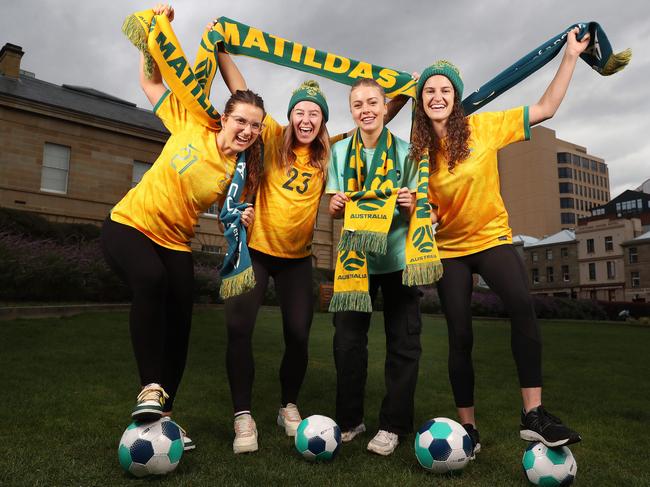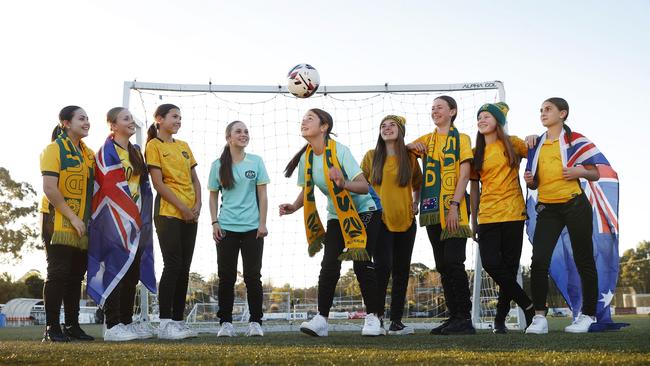Matilda mania delivers $7.6 billion boost to economy
It’s an Australian sporting story for the ages. The Matildas march to glory has delivered a $7.6bn boost to the economy and taken the entire nation along for the ride.
NSW
Don't miss out on the headlines from NSW. Followed categories will be added to My News.
Any plans for Saturday night? Cancel them. At 5pm there is only one place Australians will be, and that’s watching our green and gold girls take the field.
When the Matildas enter Suncorp Stadium on Saturday night, in their do-or-die match against France, they will do so with the support of millions of Australians behind them.
The nation has watched the team barge its way into tonight’s big clash and in so doing deliver an incredible $7.6 billion boost to the economy.
All around the country, Australians will be firing up the barbie, dusting off the garage camping chair, and sipping on a cold one while they watch the girls battle it out on the field.
Those who weren’t a football fan before, certainly are now. Almost by osmosis, millions of Australians have inadvertently caught the football bug, after watching Australia dominate it on the field.
Short term effects? Sudden and uncontrollable need to live and breathe football. Long term effects? Millions of inspired young girls.
There are hot spots of course. Those who live in the hometowns of players have almost no immunity against football fever.

In Cowra, hometown of Ellie Carpenter, schoolteacher Jacki Beale says the school ground is deep in “Matilda mania.”
“There’s certainly been a craze since the World Cup and certainly with Ellie’s stardom and success as a soccer player,” she said. While Ms Beale has always been more of a “touch football and netball” sports fan, she’s found herself swept up in soccer. It doesn’t help that she taught the star player as a child.
“She was always busy and creative and always had a zest for energy, she was naturally gifted. From a young age her skill level was years beyond her own age. We knew that she was destined for success, and had what it takes to become one of the greatest and to beat the best to be the best,” she said.
In celebration, the small country town has set up a live site for Saturday night’s game where locals will gather on the oval where the match is being streamed.
Cowra Mayor Bill West said registrations for soccer are up this year and the town is buzzing with excitement.

When asked where he will be on Saturday night, his answer was clear: “I‘ll be like everyone else sitting glued to the TV watching the Matildas.”
In Newcastle, home of Clare Wheeler, classrooms are filled with talk of soccer. PE teacher Ash Wilson taught and coached Wheeler while a student at Hunter Sports High.
“It‘s good to hear other people that aren’t necessarily footballers talking about it. The teachers are all very engrossed in what’s going on,” she said. At lunch time, those who aren’t kicking a soccer ball around can be spotted watching the game on their phones.
And when she catches them streaming the game in class?
“Usually I am watching it with them, asking them what the score is,” admitted the teacher.
At live sites across the nation, there is electricity in the air. With every lighting fast goal scored, another infected.

Some like American Jenny Romero have a genetic predisposition to the soccer fever. The Californian’s sister is Alex Morgan, a star player for the US team. While she may not play herself, her love of football runs in her blood.
“We’ve been watching women’s football for decades now. This is my third world cup,” she said.
She’s brought along her husband Ryan and two children Beckam, 2, and Liv, 4.
There’s no doubt when they leave Australia, they will take the bug with them. For others, it’s a case of reinfection. 11-year-old Sofia O’Malley played soccer for years, but stopped when she got older, because “it didn’t feel the same.”
Not anymore. It took just one visit to the Darling Harbour Live Site for the year six student to catch the bug again, with the young student admitting the Matildas “reignited a fire”.





